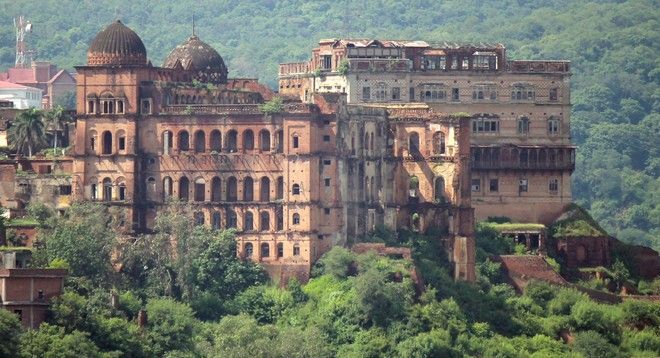Nestled in the heart of Jammu’s old city, the Mubarak Mandi Palace stands as a testament to the grandeur of the Dogra dynasty. 🏯 Spanning over 150 years of construction, this architectural marvel seamlessly blends Rajasthani, Mughal, and European Baroque styles, making it a must-visit destination for history enthusiasts and architecture aficionados alike. 🕌✨

🏛️ A Glimpse into History
Origins of the Palace
The foundation of Mubarak Mandi Palace was laid in 1710 by Raja Dhruv Dev, marking the beginning of its illustrious history. Over the centuries, successive rulers expanded and embellished the palace, culminating in its present form. 🏗️
Role of the Dogra Dynasty
Serving as the royal residence of the Dogra kings until 1925, the palace was the epicenter of political and cultural activities in Jammu. The Dogra rulers, known for their patronage of arts and culture, left an indelible mark on the region’s heritage. 👑🎨
🏰 Architectural Splendor
Fusion of Styles
The palace’s architecture is a harmonious blend of Rajasthani, Mughal, and European Baroque influences. Intricate arches, expansive courtyards, and ornate ceilings showcase the craftsmanship of the era. 🏛️
Notable Structures Within the Complex
- Pink Hall: Once the main hall, now houses the Dogra Art Museum, displaying miniature paintings and artifacts. 🖼️
- Sheesh Mahal: Known as the “Palace of Mirrors,” it dazzles visitors with its reflective surfaces and intricate glasswork. ✨
- Gol Ghar: A circular structure that adds to the architectural diversity of the complex. 🏰
- Rani Charak Palace: Dedicated to the queen, this section reflects the opulence of royal life. 👑
🖼️ Dogra Art Museum: A Cultural Treasure
Established in 1954, the Dogra Art Museum is housed in the Pink Hall. It boasts an impressive collection of over 7,000 artifacts, including:
- Pahari miniature paintings from Basohli, Jammu, and Kangra schools. 🎨
- Persian manuscripts, notably from the Shahnama and Sikandarnama. 📜
- Royal costumes, coins, jewelry, and weaponry. 💍⚔️
A highlight is the gold-painted bow and arrow believed to have belonged to Mughal Emperor Shah Jahan. 🏹👑
📍 Visiting Mubarak Mandi Palace
Location
Situated in Old Jammu, the palace is easily accessible:
- From Jammu Airport: Approximately 9 km. ✈️
- From Jammu Tawi Railway Station: About 8 km. 🚉
- From Jammu Bus Stand: Roughly 2 km. 🚌
Timings
- Winter (October to March): 10:30 AM – 4:30 PM. ❄️
- Summer (April to September): 8:00 AM – 1:30 PM. 🌞
- Closed on Mondays. 🚫
Entry Fee
- Museum: ₹20 per person. 💸
🗺️ Things to Do Around the Palace
While the palace itself is captivating, the surrounding area offers additional attractions:
- Explore the Old City: Wander through narrow lanes filled with local markets and historic sites. 🛍️
- Visit Nearby Temples: Discover the spiritual heritage of Jammu by visiting temples like Raghunath Temple. 🛕
- Enjoy Local Cuisine: Savor traditional dishes such as Rajma Chawal, Kaladi Cheese, and Khatta Meat. 🍛
🛠️ Preservation Efforts
Over the years, parts of the palace have suffered due to natural calamities and neglect. However, concerted efforts are underway to restore and preserve this heritage site. The Archaeological Survey of India (ASI), in collaboration with the Jammu and Kashmir Government, is actively involved in conservation projects to ensure the palace’s longevity. 🛡️
🌟 Conclusion
The Mubarak Mandi Palace is more than just a historical monument; it’s a window into the rich cultural tapestry of Jammu and Kashmir. Whether you’re an architecture enthusiast, a history buff, or a traveler seeking to explore the depths of India’s heritage, a visit to this palace promises an enriching experience. 🧳
❓ Frequently Asked Questions
1. Is photography allowed inside the palace?
📸 Yes, photography is permitted in most areas. However, it’s advisable to check for specific restrictions within certain sections.
2. Are there guided tours available?
🎤 Yes, local guides are available to provide insights into the palace’s history and architecture.
3. Can I buy souvenirs at the palace?
🛍️ Yes, there are shops near the palace where you can purchase traditional handicrafts and souvenirs.
4. Is the palace wheelchair accessible?
♿ Efforts are being made to improve accessibility, but it’s recommended to check in advance for specific facilities.
5. Are there any nearby accommodations?
🏨 Yes, there are several hotels and guesthouses in the vicinity catering to various budgets.
Feel free to share this blog post with fellow travelers and history enthusiasts! 🌍✈️